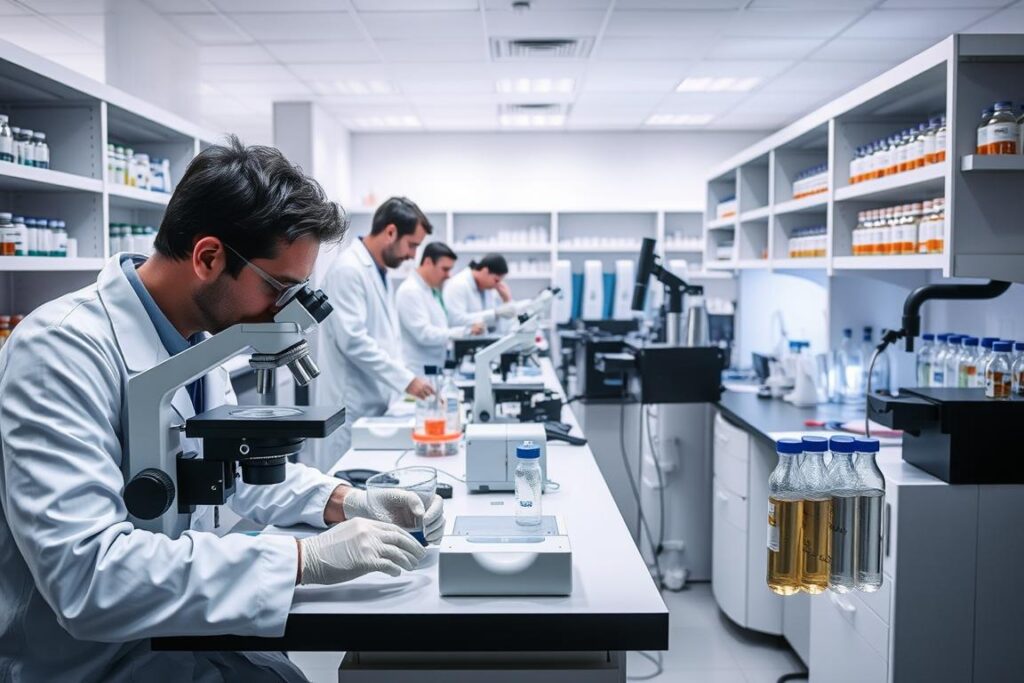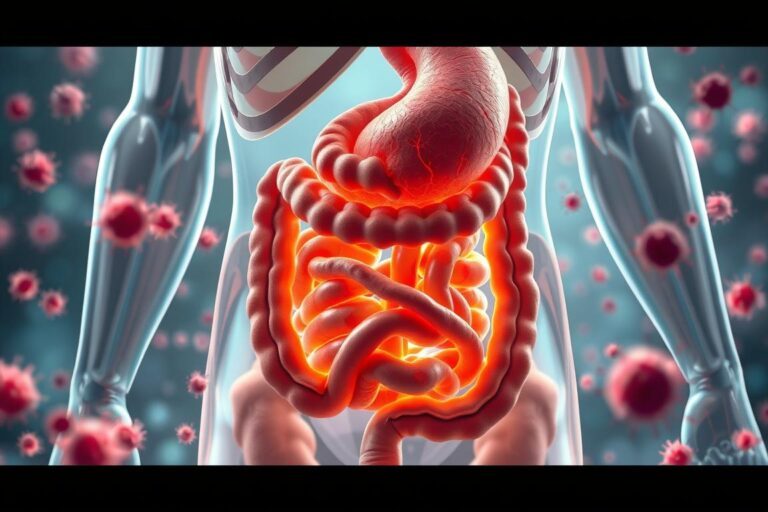Longevity research – the science of healthy ageing
Did you know that genetic predispositions only account for 10-15% of the ageing process, while lifestyle and environmental factors play a much greater role? This surprising finding underlines the importance of ageing science and its search for ways to prolong life and age healthily. In this article, you will learn all about the exciting advances and methods in longevity research that aim to improve our quality of life as we age.
Important findings:
- 🧬 Telomeres, the protective caps of our chromosomes, shorten over time – but this can be slowed down! Substances such as fisetin, resveratrol and spermidine have a supporting effect ⏳🍇 .
- 🔗 Spermidine and resveratrol also help to maintain proteostasis (i.e. the balance of our cell proteins) and improve cellular communication 🤝🧪 .
- 🛡️ Antioxidants such as EGCG (from green tea 🍵) and coenzyme Q10 protect our DNA from damage and help to maintain genomic stability 🧫✨ .
- 🧠 The molecule alpha-ketoglutarate (AKG) can positively influence epigenetic processes – studies even show a possible rejuvenation of the epigenetic age by up to 8 years 🔄🧓 ➡️ 🧑 .
- 🔥 Chronic inflammation is considered a driver of ageing. Active ingredients such as quercetin, berberine, betaine and other antioxidants effectively counteract this 🧯🌿 .
Introduction to longevity research
The foundations of longevity research are concerned with the study of biological ageing processes and their influence on human health. A central aspect of research on aging is the biological rate of aging, which is determined by the state of cells and patterns of DNA methylation. A study published in JAMA shows that older biological age reduces the likelihood of reaching the age of 90 in good health by 32%. These findings provide an introduction to healthy ageing and motivate further research.
Research on ageing has found that lifestyle factors such as diet, exercise and smoking cessation can have a significant impact on epigenetic markers and therefore on biological age. For example, former smokers show epigenetic markers that are similar to those of non-smokers. Blood tests, such as the neotes bioage longevity test, analyze DNA methylation patterns to determine biological age. Such tests are crucial to the foundations of longevity research.
The Fasting Mimicking Diet, researched by Valter Longo, has been shown to promote stem cell regeneration and improve cell health, potentially slowing down biological ageing. A 33% increase in articles on ageing in 2023 compared to previous years and a 40% increase in studies on longevity illustrate the growing importance of this area of research. Studies on the effect of strength training on ageing have doubled in the last ten years, while sleep science has six times more studies in 2023 than in 2003 and more than twice as many as in 2013.
Research on ageing focuses on understanding and influencing biological ageing processes in order to extend healthy lifespan. Key features of ageing include telomere shortening, oxidative stress and loss of proteostasis. Telomeres, protective caps on chromosomes, shorten with each cell division and thus contribute to ageing. Another essential concept is oxidative stress, which is caused by free radicals and leads to cell damage. Autophagy, a cellular cleansing process, helps maintain cell health and could slow down ageing.
The 12 key processes of ageing
With advancing age, various biological changes occur that are referred to as ageing processes. Research has identified 12 key processes that are responsible for ageing at a cellular and molecular level.
Shortening of the telomeres
Telomeres are the protective caps of chromosomes that shorten with each cell division. This telomere shortening ultimately leads to cell mortality and senescence. Certain substances such as fisetin and resveratrol can stimulate telomerase activity and thus lengthen telomeres, which can contribute to a longer lifespan.
Genomic instability and DNA damage
Genomic instability and DNA damage are caused by external influences such as UV radiation and toxic substances. With increasing age, the repair mechanisms of the cells decrease, which leads to an accumulation of DNA damage. Antioxidant substances such as EGCG-rich green tea extract or coenzyme Q10 can help to minimize this damage and support the DNA protection function.
Loss of proteostasis
Proteostasis refers to the balance and quality of proteins in the body. With age, the ability of cells to remove damaged or misfolded proteins decreases. As a result, toxic protein aggregates accumulate, which can lead to neurodegenerative diseases. The intake of antioxidant substances such as alpha-ketoglutarate and spermidine can reduce the loss of proteostasis and support protein function.
Innovative methods for optimizing health
Today more than ever, health optimization is the focus of medical research and practice. By using innovative health strategies and modern medical technology, individual health profiles can be created and treatment-optimizing measures can be introduced.
Personalized medicine plays a central role in health optimization by enabling tailored treatment plans based on genetic and epigenetic factors. An example of this development is the German Clinic for Prevention, which uses modern diagnostics and genetic profiles to develop precise and individualized therapies. Substances such as resveratrol and curcumin have attracted particular attention as they show significant positive effects on cell regeneration and longevity.
The integration of artificial intelligence (AI) and wearables into medical practice enables continuous monitoring and adaptation of health strategies. Studies have shown that moderate calorie reduction can slow down the ageing process and thus form part of effective health optimization strategies.
Another focus is on lifestyle factors such as diet, exercise and stress management, which can have a significant impact on health. According to studies, up to 70% of disease risks can be reduced through lifestyle adjustments, underlining the importance of tailored diet and exercise plans.
Epigenetics also plays a central role in health optimization. Targeted intervention measures based on epigenetic findings can influence ageing processes. The use of modern blood tests to predict diseases up to ten years in advance is another example of the progress made in modern medical technology.
In summary, it is clear that innovative health strategies, supported by modern medical technology, are crucial for optimizing individual health. Advances in research and the integration of new technologies offer promising prospects for a healthier, longer life.
Longevity through modern research
In recent years, the results of modern research have shown that longevity is not determined by genetic factors alone. In fact, genes only account for about 25% of the determination of lifespan. This means that the majority of our longevity can be influenced by our lifestyle choices.
A health-conscious lifestyle can increase life expectancy by over 20 years. Regular physical activity, stress management and a nutritious diet play a crucial role in this. Modern research has found that exercise, including strength training and regular exercise, has a positive impact on our health and longevity.
“Positive social relationships can reduce the risk of death by 24%,” according to research that emphasizes the value of social interactions and a supportive environment.
Scientists have discovered that certain genes, such as the FOXO3 gene, are associated with increased longevity. This gene regulates cell protection and repair mechanisms that contribute significantly to longevity. Nevertheless, less than 1% of the population have the genetic predisposition for extreme longevity, which underlines the importance of a healthy lifestyle.
Modern research shows that, in addition to genetic predisposition, factors such as stress management through techniques such as the 4-7-8 breathing method to reduce chronic stress, a balanced diet, adequate sleep and strong social connections are essential for a long and fulfilling life. Diagnosing and treating undetected high blood pressure can also significantly reduce the mortality rate from cardiovascular disease.
In summary, modern research confirms that we can significantly influence our age and well-being through our lifestyle choices. These findings offer valuable insights into how we can lead a healthy and long life.
The role of preventive medicine in healthy ageing
Preventive medicine plays a central role in healthy ageing by helping to prevent chronic diseases through early detection and targeted health analysis. These preventive measures help to reduce people’s biological age, thereby increasing their quality of life and extending their life expectancy. A healthy lifestyle combined with regular check-ups can have a positive impact not only on physical health, but also on mental health.
Early detection and prevention
Early detection and regular check-ups are fundamental components of preventive medicine. Through systematic health analyses, diseases such as cancer, diabetes and heart disease can be detected at an early stage and treated effectively. Research shows that a healthy lifestyle, including regular exercise, healthy eating, adequate sleep, non-smoking and moderate alcohol consumption, can slow down the ageing process. By integrating such measures into everyday life, biological age can be significantly reduced.
Individual health analyses
Individual health analyses offer the opportunity to develop personalized prevention strategies. These analyses include various tests and evaluations that are tailored to the specific needs and risks of each individual. An individualized approach can, for example, take genetic predispositions into account and thus provide tailored recommendations for diet, exercise and other lifestyle factors. The use of health analyses makes it possible to design preventive measures in a targeted and effective manner in order to sustainably improve well-being and quality of life.
Drug development in longevity research
Drug development is a key component of longevity research as it has the potential to make significant progress in extending healthy lifespan. In recent years, numerous innovative therapeutic approaches have been explored that address specific needs and target the various mechanisms of ageing.
A key area of research is the investigation of peptide receptor-mediated radionuclide therapies (PRRT). Dr. Linda Hammerich is investigating how these therapies affect the immune system of patients with neuroendocrine tumors in order to develop new biomarkers and combination therapies. This work could point the way to new therapeutic approaches in longevity research.

Another example is the research of Dr. Henry Fechner, who is developing synthetic infectious RNA to create a novel immunotherapy against colorectal cancer. This innovative approach has the potential to fight not only cancer but also age-related diseases, which often share similar molecular mechanisms.
The role of fatty acids and their effects on the function of natural killer cells (NK cells) in liver metastases is being researched by Dr. Katrin Böttcher. Her studies could lead to new anti-ageing drugs that specifically target age-related changes in the immune system.
Dr. Wilhelm Palm is investigating mechanisms that lead to resistance to mTORC1 inhibitors in pancreatic cancer, including the role of tRNA modification enzymes. These findings could have important implications for the development of drugs that slow down or even reverse ageing processes.
In summary, it can be said that drug development in longevity research opens up promising ways of slowing down ageing processes in a targeted manner and significantly improving the quality of life in old age. Continuous research and the development of new therapeutic approaches are crucial to successfully overcoming the challenges of ageing.
Long-term studies on various anti-ageing measures
Modern science is shedding more and more light on the mechanisms of ageing and longevity. Long-term studies play a crucial role in evaluating and understanding the effectiveness of various anti-ageing measures. These studies show how targeted changes in diet and physical activity can positively influence health and ageing.
Nutrition and longevity
Nutrition is a key factor in anti-ageing. Dr. Nir Barzilai, for example, emphasizes that targeted nutrition in combination with preventive medicine and innovative therapies can influence biological ageing. Bryan Johnson uses nutrients such as spermidine, NAD+, resveratrol and quercetin to support cell functions and slow down ageing processes. Long-term studies also show that calorie reduction and a balanced diet can have a life-prolonging effect.
Physical activity
Physical activity is another key factor in promoting longevity. Regular exercise not only improves general fitness, but also has a positive effect on biomarkers such as CRP, IL-6 and TNF-alpha. These markers are indicators of inflammation and ageing processes in the body. Studies show that exercise can reduce cell ageing and significantly improve quality of life in old age.
Researchers such as David Sinclair have impressively demonstrated that epigenetic changes and interventions in cell function can have life-prolonging effects. His studies using chemical cocktails to restore cellular functions in mice prove the potential of anti-ageing research through long-term studies.
The adaptive possibilities of ageing, also referred to as “plasticity”, prove that individual health plans, based on genetic predispositions and lifestyle factors, can be specifically tailored to positively influence ageing and promote longevity.
The importance of epigenetic research
Epigenetics plays a key role in ageing research by investigating the mechanisms that influence genetic regulation. One notable example is epigenetic clocks, which use DNA methylation patterns to measure biological age. Steve Horvath’s epigenetic clock is based on 353 CpG sites and has shown that these patterns correlate strongly with ageing and can even predict lifespan and health.
“Epigenetic drift, the gradual changes in DNA methylation over time, is an important marker of biological aging and is strongly influenced by environmental and lifestyle factors.” – Study on epigenetic drift
Further research has shown that interventions such as caloric restriction and exercise can have positive effects on epigenetic markers and slow down ageing. Of particular interest are studies with twins, which show that epigenetic differences increase with age, highlighting the role of the environment in shaping the epigenome.
Epigenetic mechanisms such as DNA methylation and histone modifications change with age and influence genetic regulation. This loss of precision, known as epigenetic drift, is considered a major mechanism of biological aging. Impressive research with mice has shown that reintroducing Yamanaka factors can reverse epigenetic changes and reduce biological age.
Interestingly, genetic polymorphisms such as in the APOE and FOXO3 genes are associated with longevity and show how strongly genetic and epigenetic factors can influence ageing. These findings from epigenetics could offer revolutionary approaches to extending healthy lifespan.
The microbiome and healthy ageing
The microbiome plays a central role in gut health and therefore also in the ageing process. Scientific studies, such as those conducted by Keio University in Japan, show that a healthy microbiome reduces inflammation, strengthens the immune system and can extend lifespan. The presence of Bifidobacterium and Lactobacillus species decreases with age, while harmful microorganisms increase. However, a varied diet can help to maintain a healthy intestinal flora.
“People who live to be over 100 years old often have a unique composition of intestinal flora that protects them from certain diseases”
According to Nature Aging (2023), a diverse microbiome is associated with lower susceptibility to age-related diseases. People in so-called “blue zones”, areas with high life expectancy, often have a resilient microbiome that contributes to their exceptional longevity.
Diet also plays an important role: prebiotics, which are found in whole grains, fruit and vegetables, serve as food for beneficial intestinal bacteria. Fermented foods such as kimchi, tempeh, yoghurt, kefir and sauerkraut are rich in probiotics and can restore the balance in the gut. Moderate physical activity and sufficient sleep further promote the diversity of the microbiome, while chronic stress can have a negative effect on the composition of the intestinal flora.
- Intermittent fasting increases the population of healthy intestinal bacteria.
- Antibiotics disrupt both harmful and beneficial bacteria; it is important to rebuild the intestinal flora after use.
In summary, it can be said that a plant-based, varied diet promotes the diversity of intestinal bacteria and thus supports healthy ageing. Research into the microbiome provides us with valuable information on how we can positively influence our gut health and therefore also the ageing process.
Practical tips for healthy ageing in everyday life
Healthy ageing can be supported by simple and effective everyday tips. Here are some proven strategies to help promote well-being as we age:
Nutrition strategies
Nutrition plays a crucial role in healthy ageing. A plant-based diet, rich in nutrients such as spinach, broccoli, berries and nuts, should be a priority. Sugar and dairy products, on the other hand, should be avoided. Berries are particularly recommended due to their high antioxidant content. Regular consumption of nuts and seeds also provides healthy fats and fiber, which are important for health. In addition, eating fatty fish such as salmon and mackerel, which are enriched with omega-3 fatty acids, supports the cardiovascular system.
Exercise and fitness
Regular physical activity is essential. Strength and endurance training strengthen muscle mass, bones and the cardiovascular system. But even simple activities such as climbing stairs or cycling can bring enormous benefits. Integrating exercise into everyday life by making small changes, such as taking the stairs instead of the elevator, can work wonders. Regular stretching also helps to maintain flexibility and general mobility.
Stress management
Reducing stress is a key factor in healthy ageing. Techniques such as yoga, meditation and deep breathing exercises can help to reduce stress and improve mental health. In addition, social contacts and strong family ties contribute significantly to life satisfaction. Sleep quality also plays an important role. At least 8 hours of sleep per night is important to regenerate body and mind.
Regardless of the methods and daily tips that are followed, it is crucial that they are consistently and sustainably integrated into the daily routine to achieve the best results.
Examples of successful anti-ageing approaches
Longevity research has uncovered various anti-ageing approaches that have the potential to prolong life and improve quality of life. One of the most promising approaches is the use of rapamycin, which has been shown to prolong life in mice. Similarly, metformin has shown positive results in prolonging life in mice, flies and worms.
Another impressive anti-ageing example is the use of senolytics, which have a rejuvenating effect in mice. These substances help to eliminate old and damaged cells, leading to improved overall health. In this context, blood plasma therapy is also showing promising results. Studies on older mice have shown an improvement in health and cognitive abilities.
One of the successful strategies is the epigenetic life clock, which can be used to measure biological age. This technology has the potential to develop more precise anti-ageing measures. Another strategy worth mentioning is calorie restriction, which has led to a 30-40% increase in life expectancy in mice with a 40% reduction in calorie intake.
Hormone therapies also play an important role in successful strategies against ageing. Growth hormone (GH) influences muscle mass, metabolism and cognitive functions. DHEA has an effect on mood, well-being and cognitive functions, while oestrogens have a positive influence on bone density and cardiovascular health. Testosterone promotes muscle strength and cognitive functions.
Finally, research on telomeres should be emphasized. Telomere length is closely linked to ageing and various diseases. By activating telomerase and targeted gene therapy, direct interventions in telomere biology could influence ageing in the long term.
The future of longevity research
Longevity research is on the cusp of groundbreaking developments that could revolutionize ageing. Key players such as Aubrey de Grey and David Sinclair are shaping innovative ageing research with visionary approaches. De Grey pursues the goal of eliminating ageing through cell repair and the removal of toxic waste. Sinclair, on the other hand, claims that he has been able to turn back his biological age by ten years through targeted lifestyle changes. Such striking examples underline the future trends in longevity research.
Blue Zones, such as those found in regions like Nicoya in Costa Rica and Ikaria in Greece, offer valuable insights into healthy ageing. These zones are characterized by plant-based diets, regular physical activity, strong social ties and stress-reducing practices. They are vivid examples of how the combination of lifestyle and various interventional approaches can contribute to longevity. There are clear parallels with the Twelve Key Processes of Ageing, which are being investigated in various long-term studies.
Companies such as Calico, a Google-backed initiative, are investing heavily in life extension research. Companies such as Avea Life and Bedrop are also focusing on the highest quality standards and natural ingredients to develop age-optimizing products. These developments highlight the ever-growing importance of longevity research and show that the future trends in longevity research are not only being driven by scientific laboratories, but also by entrepreneurship and society as a whole.




